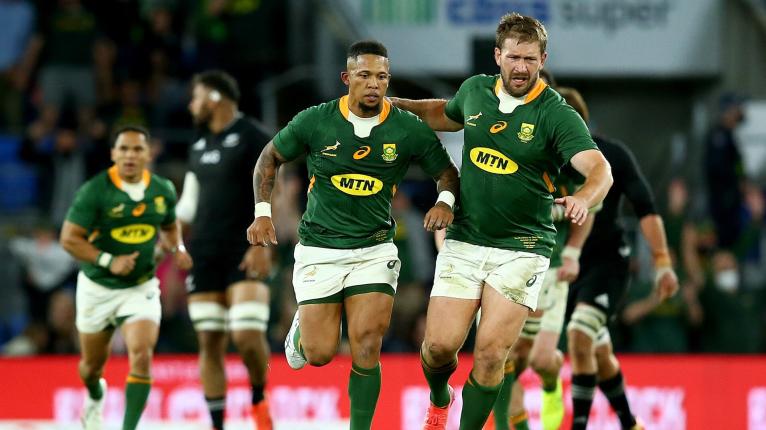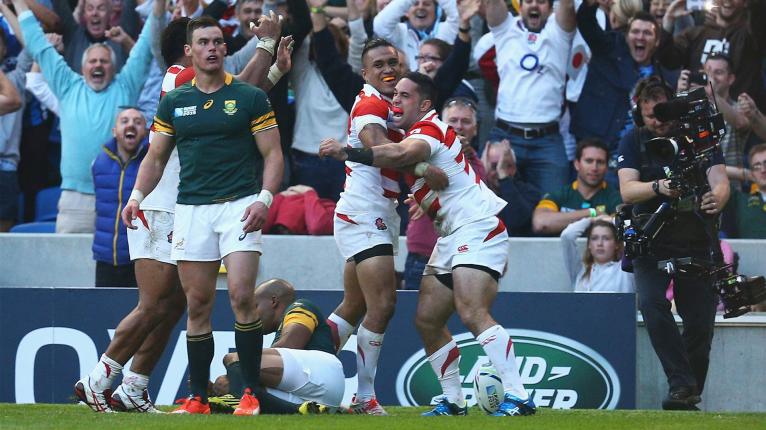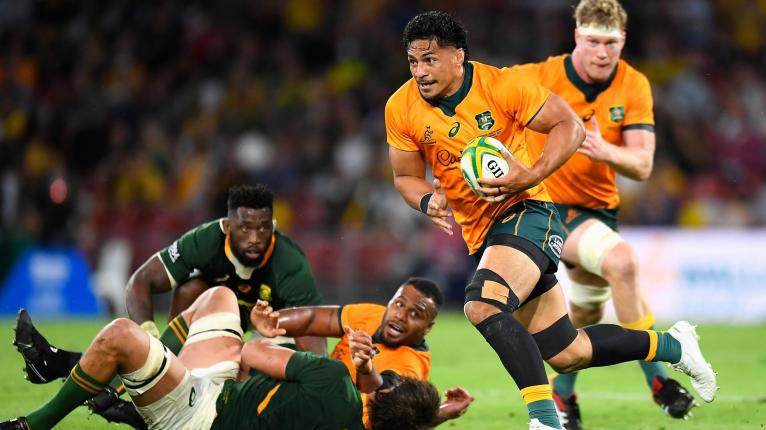There’s a huge amount at stake for the Brave Blossoms this weekend when they take on the Wallabies in Oita.
Japan’s standing in world rugby has increased steadily over the past decade, with their domestic competition going from strength to strength and enticing superstars from around the world, and their national side making huge strides on the park.
The 2019 Rugby World Cup was an unmitigated success, with the Brave Blossoms earning their best-ever result, bowing out in the quarter-finals, and fans flocking to stadiums from around the country (and the globe) to ensure the tournament was the good news story rugby needed prior to the disruption of the global pandemic less than a year later.

Said pandemic has complicated things for Japan.
While the Top League boasted huge crowds to kick off the 2020 season – largely on the back of the successful World Cup – Covid quickly saw the competition derailed and even in 2021, crowds were kept to a manageable level.
When the rebranded competition kicks off next season, the casual fan may have already moved on to bigger and brighter things, with the World Cup but a memory lost in the chaos of the past two seasons.
The Brave Blossoms also spent the entirety of 2020 on ice, only making their first appearance since the World Cup when they travelled to Europe to take on the British and Irish Lions in Scotland, and Ireland in Dublin earlier this year.
The USA is understandably viewed as the next frontier of the sport but there’s still plenty of untapped potential in Asia. Japan, as said continents’ most capable side by some distance, is the gateway to all that the eastern world promises.
It was hugely important for the game as a whole to see the darlings of global rugby back on the pitch, especially given how crucial Japan is as a growing market.
The USA is understandably viewed as the next frontier of the sport but there’s still plenty of untapped potential in Asia. Japan, as said continents’ most capable side by some distance, is the gateway to all that the eastern world promises.
That gateway narrows, however, as Japan’s interest wanes, which is why it was so important that the Brave Blossoms were able to take the field against the Lions.
For the team itself, their temporary stint in the test wilderness won’t necessarily have harmed their on-field prowess, if the performances of Argentina and South Africa when they first returned to the international arena are anything to go by.
The Springboks, like Japan, sat out the entirety of the 2020 season but upon their return to test rugby this year, managed to secure wins against both the Lions and the All Blacks.

The conservative style they adopted in the formative part of the year may have been a product of their lack of time together, with Jacques Nienaber and Rassie Erasmus perhaps fearful of the response they’d receive if the world champions were dismantled by their opposition week after week.
At the very worst, the kick-heavy game plan kept games relatively close.
Regardless, however, the wins fell their way and now that the Rugby Championship is well and truly over and the end of year internationals are set to kick off, it almost feels like the Springboks were never absent.
Results were even better for the Pumas in their return to play during last year’s Tri-Nations. While Argentina didn’t sit out test rugby for very long, the bulk of their squad weren’t able to play any rugby from the time that Super Rugby was called to a halt in March until the Pumas’ first test of the season against the All Blacks in November – more than a month after the All Blacks and Wallabies had kicked off their campaigns.
Japan don’t have the pedigree of South Africa, nor the preparation time of Argentina and they’re now just days away from facing off with a Wallabies side flying high on the back of four wins on the trot, including two against the Springboks.
Argentina finished their campaign with a 50 per cent record thanks to a historic win over the All Blacks (coupled with the customary loss) and two draws with the Wallabies.
The Pumas, however, assembled as a group in mid-August, which undoubtedly played a big part in their committed and controlled showings three months later.
Japan don’t have the pedigree of South Africa, nor the preparation time of Argentina and they’re now just days away from facing off with a Wallabies side flying high on the back of four wins on the trot, including two against the Springboks.
While it’s not necessarily a common sight just yet, the Brave Blossoms are no strangers to facing off against tier-one nations.
The team has been on a steady rise for the past two World Cup cycles, claiming historic scalps over the likes of South Africa, Scotland and Ireland.
Notably, however, all three of those victories have come during Rugby World Cups – with the past two secured on the back of perhaps the longest preparation camp in rugby’s history.

Japan’s wider World Cup squad first assembled in February of 2019 and the bulk of the team that achieved their historic quarter-final finish later that year had spent considerable time together in the lead-up.
Like the Pumas in 2020, the Brave Blossoms understood each other intimately and were playing like a well-oiled machine when the World Cup finally arrived in September. They may not have had the best players in the tournament (although there absolutely were some standouts), but they were perhaps the best-synchronised collective.
They were also able to out-speed their opposition, making every play at a breakneck pace – whether it was sending the ball into the backline or crashing it up through the forwards, there was never any downtime.
It’s a style that works very well against the likes of the Springboks and the Northern Hemisphere sides who, for all their endeavour, still don’t quite operate with the same agility as the All Blacks or Wallabies.
Japan have aspirations of playing in the Rugby Championship and if that’s ever to be accomplished, they need to show that they can eventually foot it with NZ and Australia on a weekly basis. That starts this weekend.
The last time that Japan faced off with Australia, back in 2017, they were demolished 63-30, scoring just three tries to the Wallabies’ nine.
Their game against New Zealand a year later went even worse, with an experimental All Blacks team boasting 20 players with fewer than 20 caps (including eight debutants) recording a 69-31 victory.
Japan have aspirations of playing in the Rugby Championship and if that’s ever to be accomplished, they need to show that they can eventually foot it with NZ and Australia on a weekly basis. That starts this weekend.
Dave Rennie isn’t taking any chances and has named close to a full-strength line-up, sans the unavailable Marika Koroibete and Samu Kerevi.
Jamie Joseph, meanwhile, has benched World Cup stars Michael Leitch and Yu Tamura in favour of younger options. With both Leitch and Tamura on the wrong side of 30, there are no guarantees that either will make the 2023 World Cup and Joseph is ostensibly looking to the future, with more aerobic options selected to try and tire out the Wallabies’ bigger forwards.

The Wallabies are undefeated against Japan and the first match of their northern tour presents Rennie’s men with the opportunity to nail a fifth straight victory and put them in good stead ahead of clashes with Scotland, England and Wales.
The stakes, however, are higher for Japan – who are yet to taste victory since the pool stages of the 2019 World Cup, where they went undefeated against Russia, Samoa, Ireland and Scotland.
Rematches with the latter two are on the cards in November and after falling to defeat to an understrength Irish side earlier this year, the Brave Blossoms must show they can compete even when they’re not playing at home in front of a packed-out stadium.
But, they do have that home advantage against the Wallabies in Oita this weekend – even if they’re not playing in front of a full crowd.
Now is the time for Japan to remind the rugby world – and their local fanbase – what they’re capable of, now is the time for Japan to show that they can perform even when the odds aren’t all in their favour, and now is the time for the Brave Blossoms to prove they can foot it with the fast-paced style of play they’ll face on a weekly basis should they join the Rugby Championship.



Again great intro, Tom! I have a feeling that a fresh looking Japan side could be a real banana-skin experience for Rennie's Wallabies! If the Brave blossoms could prevail it would seal a RC invitation long overdue IMHO! 😍